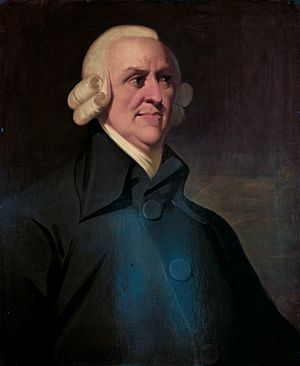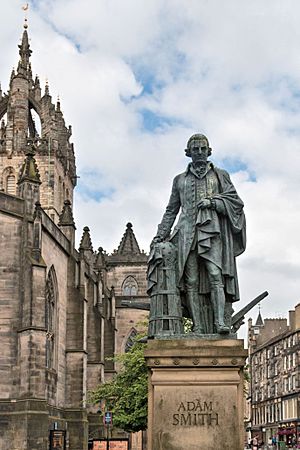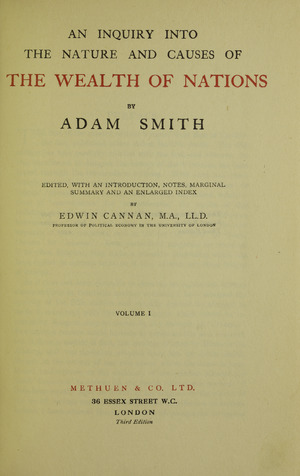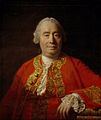Adam Smith facts for kids
Quick facts for kids
Adam Smith
|
|
|---|---|

Portrait of Adam Smith by an unknown artist (Scottish National Gallery)
|
|
| Born | c. June 16 [O.S. c. June 5] 1723 |
| Died | July 17, 1790 (aged 67) Edinburgh, Scotland
|
| Nationality | Scottish |
| Alma mater | University of Glasgow Balliol College, Oxford |
|
Notable work
|
The Wealth of Nations The Theory of Moral Sentiments |
| Region | Western philosophy |
| School | Classical liberalism |
|
Main interests
|
Political philosophy, ethics, economics |
|
Notable ideas
|
Classical economics, free market, economic liberalism, division of labor, absolute advantage, The Invisible Hand |
| Signature | |
Adam Smith was a very important Scottish thinker who lived from 1723 to 1790. He is often called the Father of Modern Economics. He was an economist and a philosopher.
Smith is best known for his famous book called The Wealth of Nations. This book was published in 1776. It introduced many key ideas that are still used in modern economics, especially about how market economies work.
In The Wealth of Nations, Adam Smith explored how a country can become wealthy. He suggested that if each person focuses on what is best for themselves and their close circle, the whole country benefits. This is because individuals know their own needs and situations much better than any government can.
Contents
Adam Smith's Early Life and Education
Adam Smith was born in Kirkcaldy, Scotland. We don't know his exact birth date, but he was baptized on June 16, 1723. His father, also named Adam Smith, died before he was born. His mother, Margaret, raised him.
From 1729 to 1737, he went to the Burgh School of Kirkcaldy. There, he learned subjects like Latin, mathematics, history, and writing. When Smith was 14, he started attending the University of Glasgow in Scotland. He studied moral philosophy under a famous teacher named Francis Hutcheson. Later, he went to Oxford University in England. However, he felt the teaching was better back at the University of Glasgow.
Adam Smith's Teaching Career
Adam Smith began giving lectures at the University of Edinburgh in Scotland in 1748. In 1750, he met David Hume. Hume and Smith became good friends because they both loved philosophy and economics.
In 1751, Smith became a professor at his favorite school, Glasgow University. He became the head of Moral Philosophy. After he published his first book, The Theory of Moral Sentiments, he started teaching more about economics and jurisprudence (the study of law). In 1762, he received the title of Doctor of Laws (LL.D.) from Glasgow. Soon after, he stopped teaching at the university. He then became a tutor for Henry Scott, who was the nephew of Charles Townshend.
Adam Smith's Important Books
While teaching at Glasgow, Smith published his first book, The Theory of Moral Sentiments, in 1759. This book talked about mutual sympathy, which is like empathy. It means understanding and sharing the feelings of another person. This book made him very popular. Many rich students from other countries came to study at the University of Glasgow because of him.
After Henry Scott's younger brother died in Paris, Adam Smith went back home to live with his mother. There, he wrote his most famous work, An Inquiry into the Nature and Causes of the Wealth of Nations. This book is usually just called The Wealth of Nations. In it, Smith explained new economic ideas that still affect societies today. Here are three of his main ideas:
Gross Domestic Product (GDP)
- This was a new way to measure how wealthy a nation was. Instead of counting how much gold or silver a country had, Smith suggested measuring the total amount of goods and services a nation produces. This total is called the "Gross Domestic Product" (GDP). Today, most countries use GDP to see how well their economy is doing.
Division of Labor
- Smith explained how important it is to divide up work to make products. When people focus on one specific part of a job instead of many different parts, they can work faster and better. He believed that when everyone specializes and becomes good at one task, all those parts can be put together to create the best product.
The Invisible Hand
- Smith introduced the idea that when people buy things for themselves, they also help the economy as a whole. For example, when you buy groceries for your family (which helps you), you are also helping to pay the grocery store and the farmers. This helps them buy what they need too. Smith called this helpful effect the "invisible hand" because it seems to guide everyone to help each other, even when they are just trying to help themselves.
Adam Smith's Death and Legacy

Adam Smith died in Edinburgh, Scotland, in 1790. His book The Wealth of Nations was the first really important book about economics. Many countries today still use his ideas about market economics.
Famous Quotes from Adam Smith
- “Every man lives by exchanging.”
- “Man is an animal that makes bargains: no other animal does this - no dog exchanges bones with another.”
- “It is not very unreasonable that the rich should contribute to the public expense, not only in proportion to their revenue but something more than in that proportion.”
- “Though our brother is upon the rack, as long as we ourselves are at ease, our senses will never inform us of what he suffers."
- "The real price of everything, what everything really costs to the man who wants to acquire it, is the toil and trouble of acquiring it.”
Key Facts About Adam Smith
- Adam Smith is known as "The Father of Modern Economics."
- He was born in Scotland and studied at the University of Glasgow. His teacher was the famous philosopher Francis Hutcheson.
- Smith also went to Oxford University but preferred the teaching at the University of Glasgow.
- He taught at Glasgow for many years and wrote his first book, The Theory of Moral Sentiments, there.
- After his first book was published, Smith started teaching more about economics and the study of law.
- He tutored Henry Scott after leaving his teaching job at Glasgow.
- After Henry's brother passed away, Adam Smith returned home to live with his mother. There, he wrote his most famous book, The Wealth of Nations.
- The Wealth of Nations shared economic ideas that are still used by many countries today.
Related pages
Images for kids
-
François Quesnay, a leader of the physiocratic school of thought
-
David Hume was a friend and contemporary of Smith's.
-
A commemorative plaque for Smith in his home town of Kirkcaldy.
-
James Tassie's enamel paste medallion of Smith.
-
Later building on the site where Smith wrote The Wealth of Nations
-
Smith's burial place in Canongate Kirkyard
-
The Adam Smith Theatre in Kirkcaldy
-
Statue of Smith built in 1867–1870 at the old headquarters of the University of London, 6 Burlington Gardens
-
Adam Smith's Spinning Top, sculpture by Jim Sanborn at Cleveland State University
See also
 In Spanish: Adam Smith para niños
In Spanish: Adam Smith para niños
 | Sharif Bey |
 | Hale Woodruff |
 | Richmond Barthé |
 | Purvis Young |













